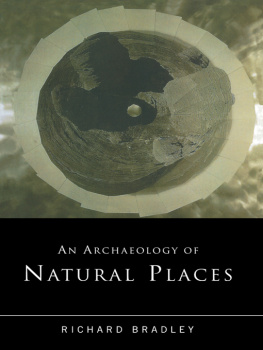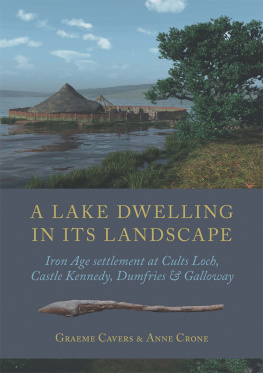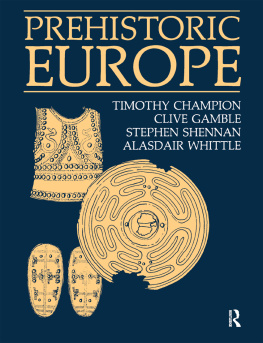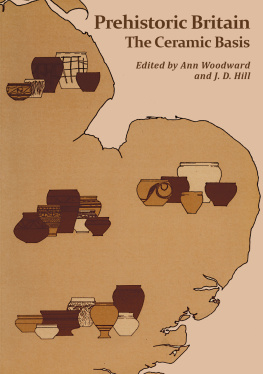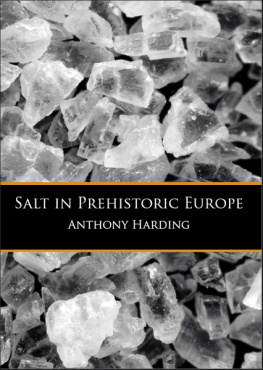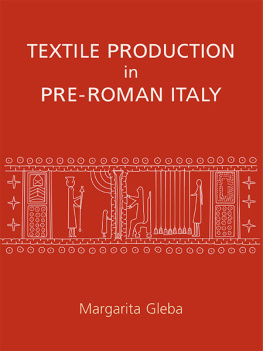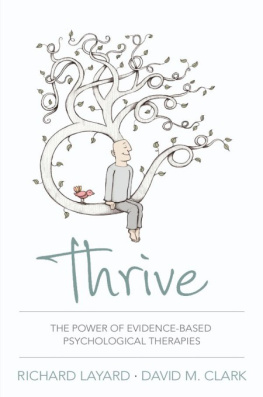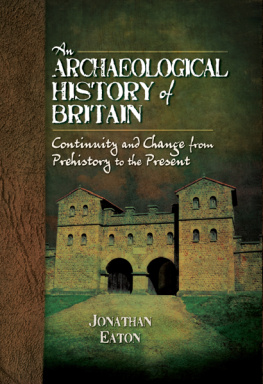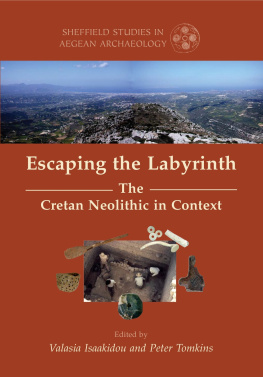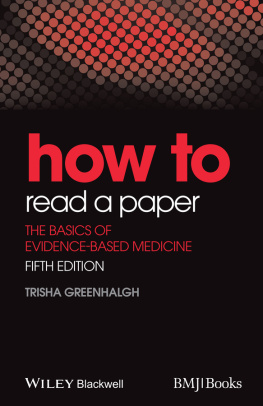ROUTLEDGE LIBRARY EDITIONS: ARCHAEOLOGY
Volume 6
THE PREHISTORIC SETTLEMENT OF BRITAIN
THE PREHISTORIC SETTLEMENT OF BRITAIN
RICHARD BRADLEY
First published in 1978
This edition first published in 2015
by Routledge
2 Park Square, Milton Park, Abingdon, Oxon, OX14 4RN
and by Routledge
711 Third Avenue, New York, NY 10017
Routledge is an imprint of the Taylor & Francis Group, an informa business
1978 Richard Bradley
All rights reserved. No part of this book may be reprinted or reproduced or utilised in any form or by any electronic, mechanical, or other means, now known or hereafter invented, including photocopying and recording, or in any information storage or retrieval system, without permission in writing from the publishers.
Trademark notice: Product or corporate names may be trademarks or registered trademarks, and are used only for identification and explanation without intent to infringe.
British Library Cataloguing in Publication Data A catalogue record for this book is available from the British Library
ISBN: 978-1-138-79971-4 (Set)
eISBN: 978-1-315-75194-8 (Set)
ISBN: 978-1-138-80828-7 (Volume 6)
eISBN: 978-1-315-75067-5 (Volume 6)
Publishers Note
The publisher has gone to great lengths to ensure the quality of this book but points out that some imperfections from the original may be apparent.
Disclaimer
The publisher has made every effort to trace copyright holders and would welcome correspondence from those they have been unable to trace.
The Prehistoric Settlement of Britain
Richard Bradley
Department of Archaeology Reading University
First published in 1978
by Routledge & Kegan Paul Ltd
39 Store Street,
London WCIE 7DD, Broadway House, Newtown Road, Henley-on- Thames, Oxon RG9 IEN and 9 Park Street, Boston, Mass. 02108, USA
Set in Baskerville and printed in Great Britain by Lowe & Brydone Printers Limited Thetford, Norfolk
Richard Bradley, 1978
No part of this book may be reproduced in any form without permission from the publisher, except for the quotation of brief passages in criticism
British Library Cataloguing in Publication Data
Bradley, Richard, b.1946
The prehistoric settlement of Britain.
(Archaeology of Britain).
I. Man, PrehistoricGreat Britain I. Title II. Series
936.101 GN805 78-40619
ISBN o 71000 8993 7
For Bari Hooper and Collin Bowen
Men are made of what is made,
The meat, the drink, the life, the corn,
Laid up by them, in them reborn.
And self-begotten cycles close
About our way; indigenous art
And simple spells make unafraid
The haunted labyrinths of the heart.
Edwin Muir, The Island
Preface
This book has happened over a long period and many debts have accrued in its composition. The most obvious are for the use of published and unpublished material and these are acknowledged at appropriate points in the text. But beyond these are other debts which no such acknowledgment can pay. I owe more to my teachers and colleagues than they might care to agree. Two of them, Barry Cunliffe and Michael Fulford, have read and commented on the manuscript. I have also discussed much of this material with John Barrett and Brendan OConnor. None of them, I suspect, has coaxed me from the errors of my ways. Alan Dingle also read the text and is responsible for the English translation. Verna Care and Julian Richards kindly drafted some of the original drawings and Sonia Burgess produced a clean typescript from an almost unreadable palimpsest. Bill and Judi Startin put me up when I began work on the book and Katherine has put up with me as I brought it to a protracted conclusion. It is dedicated to two friends: Bari Hooper, for reminding me, more than anyone else, how intellectual curiosity is a source of enjoyment; and Collin Bowen, who has shared his ideas so liberally that any merits of this book are not the authors alone.
A word about this Royal Myles na gCopaleen Institute of Archaeology. It would be rash to suppose that the Institute was just a gatherum of clay-minded prodnoses. Each branch of research has a sub-institute of its own. Within the Royal Institute you have, for instance, the Institute of Comparative Bronzes. This body is concerned only with time-bronze progressions.
Flann OBrien, from The Best of Myles (1968)
This book was planned as synthesis and has emerged as speculation. In between came a phase of Binfordian fellow-travelling. Why this uncertainty of aim? Why so many changes of plan?
Complete synthesis is always impossible since it presupposes finite data and the exhaustion of all approaches. But it is particularly difficult when so little of this basic data has been properly collected or recorded. Add to that the frustration that little carefully collected material is ever accessible. Few excavations reach the printer; academic distinction is apparently measured by the number of projects abandoned. But to turn entirely to theory would be dull for both author and reader, and to discuss methodology without appropriate data is as likely to win converts as a party political broadcast. For these reasons alone, what has emerged is a trial piece, from which outlines can be copied or erased. It is a personal interpretation of biased and elusive evidence.
The title is of course caricature. It is borrowed from a painting by Klee, who, on this occasion, was innocent of satire. Flann OBrien was not. But, like all creatures, it seizes on real features of its subject. The framework of prehistoric studies is based upon both of these sources. The bronzes provide a chronological scheme which unites local sequences over much of Europe and eventually relates them to a historical chronology. The ceramics can locate more restricted phenomena. The problem is when these objects lose all connection with the men who made them and are studied as an end in themselves, a hermetic exercise in self-validating skill. About the time that OBrien was writing, the American archaeologist, Walter Taylor, was lambasting the same evasion:
Fellow students have accused the archaeologist of tatting endless taxonomic rosettes out of the same old ball of material culture and maintained that his findings are next to useless for the purposes of history and culture study. It seems that archaeologists are becoming, as Tolstoy once said of modern historians, like deaf men answering questions which no one has asked them (1948).
The time-bronze progressions were inevitable. Without this framework there would have been no time-scale, and its long time-scale is the one contribution that prehistory can offer to other disciplines. The study of pottery could have served a similar end, but here chronology and explanation have become so tangled together that discussion often ends in deadlock. To show chronological relationships, cultural relations are inferred. These have then taken over, at times leaving a dubious historical narrative in support of a circular argument. The Childean culture is not a testable hypothesis, but it is sometimes an


